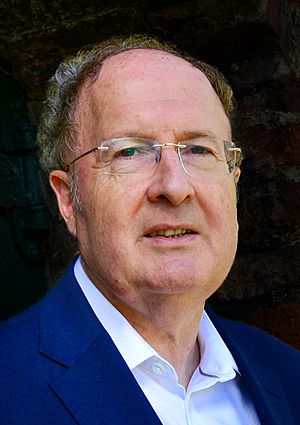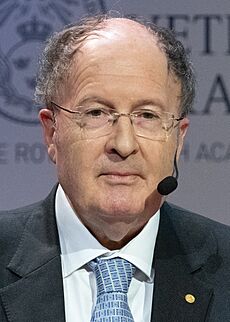Gregory Winter facts for kids
Quick facts for kids
Sir
Gregory Winter
|
|
|---|---|

Winter in 2016
|
|
| Master of Trinity College, Cambridge | |
| In office 2012–2019 |
|
| Preceded by | Baron Rees of Ludlow |
| Succeeded by | Dame Sally Davies |
| Personal details | |
| Born |
Gregory Paul Winter
14 April 1951 Leicester, Leicestershire, England |
| Website | |
| Education | Royal Grammar School, Newcastle upon Tyne |
| Alma mater | Trinity College, Cambridge (MA, PhD) |
| Known for | Cambridge Antibody Technology Domantis Bicycle Therapeutics Antibody engineering |
| Awards | Colworth Medal (1986) EMBO Member (1987) Louis-Jeantet Prize for Medicine (1989) Knight Bachelor (2004) Royal Medal (2011) Prince Mahidol Award (2016) Nobel Prize in Chemistry (2018) Copley Medal (2024) |
| Scientific career | |
| Fields | Biochemistry |
| Institutions | University of Cambridge Laboratory of Molecular Biology Imperial College London |
| Thesis | The amino acid sequence of tryptophanyl tRNA synthetase from Bacillus stearothermophilus (1977) |
| Doctoral advisor | Brian S. Hartley |
Sir Gregory Paul Winter (born on April 14, 1951) is a British scientist who won the Nobel Prize. He is famous for his work on using special proteins called monoclonal antibodies to treat diseases. Antibodies are like tiny defenders in our bodies. They help fight off germs and sickness.
Sir Gregory's research mostly happened at the MRC Laboratory of Molecular Biology in Cambridge, England. He invented ways to make antibodies from animals more like human antibodies. This made them much better for treating people. Before his work, antibodies from mice often caused problems in humans.
Because of his important discoveries, Sir Gregory Winter won the 2018 Nobel Prize in Chemistry. He shared this award with two other scientists, George Smith and Frances Arnold.
He was also the head of Trinity College, Cambridge, from 2012 to 2019. This is a very old and famous college at the University of Cambridge.
Contents
Becoming a Scientist
Sir Gregory Winter went to the Royal Grammar School, Newcastle upon Tyne. After that, he studied Natural Sciences at the University of Cambridge. He graduated from Trinity College, Cambridge in 1973.
He then earned his PhD degree in 1977. His research looked at the building blocks of a protein found in a type of bacteria. He did this research at the MRC Laboratory of Molecular Biology. Later, he continued his studies at Imperial College London.
Amazing Discoveries with Antibodies
After finishing his PhD, Sir Gregory Winter kept working at the Laboratory of Molecular Biology. He became a group leader there in 1981. He was very interested in how all antibodies have a similar basic shape. Only small parts of them change to target different invaders.
Other scientists had already found a way to make special antibodies called monoclonal antibodies. These antibodies could find and destroy specific things that attack the body. But there was a problem: if these antibodies came from mice, the human body would often fight against them. This made them less useful for treating people.
Making Antibodies Human-Friendly
Sir Gregory Winter found a way to "humanize" mouse antibodies. This means he changed them so they looked more like human antibodies. This was a huge step forward!
One important medicine developed using his technique is called Campath-1H. It is now used to treat diseases like multiple sclerosis. Today, most antibody-based medicines use Sir Gregory's humanizing technique. Many of these medicines are very successful, like Keytruda.
Starting New Companies
Sir Gregory Winter also helped start several companies. In 1989, he co-founded Cambridge Antibody Technology. This was one of the first companies to focus on making better antibodies.
One of the most successful medicines from this company was HUMIRA. It became one of the world's best-selling medicines. It helps treat diseases where the body's immune system attacks itself.
In 2000, Sir Gregory started another company called Domantis. This company worked on even smaller parts of antibodies. Later, he also founded Bicycle Therapeutics. This company develops tiny protein copies for new medicines.
Awards and Honors
Sir Gregory Winter has received many important awards for his work.
- In 1990, he became a Fellow of the Royal Society. This is a very high honor for scientists in the UK.
- He received the Royal Medal in 2011 for his groundbreaking work.
- In 1995, he won the King Faisal International Prize for Medicine.
- He was made a Commander of the Order of the British Empire (CBE) in 1997.
- In 2004, he was given the title of Knight Bachelor, which means he is now called "Sir."
- He served as the Master of Trinity College, Cambridge from 2012 to 2019.
- In 2018, he won half of the Nobel Prize in Chemistry. He was recognized for his work on using a method called "phage display" to create new antibodies.
- In 2024, he received the Copley Medal from the Royal Society. This is one of the oldest and most important science awards in the world.
See also
 In Spanish: Gregory Winter para niños
In Spanish: Gregory Winter para niños
 | James Van Der Zee |
 | Alma Thomas |
 | Ellis Wilson |
 | Margaret Taylor-Burroughs |


